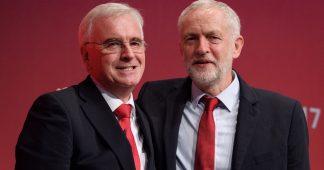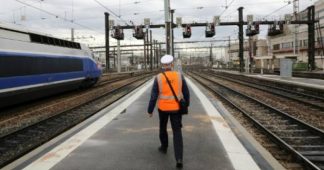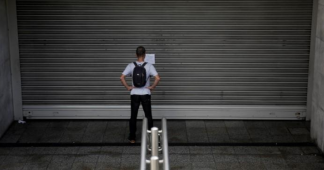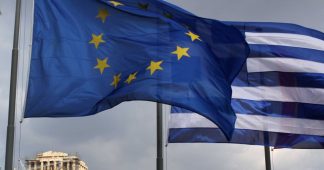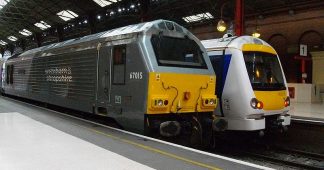March 20, 2019
Margaret Thatcher was very good at telling tall tales. Ukania’s tragedy is that far too many Brits fell for these tales.
Probably the biggest of these tales concerned the notion of a share-owning democracy.
The idea here was simple, but utterly misguided – sell off the publicly-owned enterprises, and everyone will be able to buy shares in the newly privatized companies. By buying however many shares you want, you will become a part of Thatcher’s great British share-owning democracy.
Many of us knew at that time that it was never going to be like this at all. As Marx noted, the stock exchange, where the shares of the newly privatized companies would of course be traded, is “where the little fish are swallowed by the sharks and the lambs by the stock-exchange wolves”.
The wealthy have always used their resources to acquire a monopoly on company shares. So when the public enterprises were put on sale at rock-bottom prices by Thatcher and her cronies, the wealthy rushed to collar the majority of the share offerings, the ensuing demand drove-up the price of the shares, and in so doing put nearly all of them beyond the reach of Joe and Jill Normal.
So what actually happened to the “great British share-owning democracy”?
The state bureaucrats so excoriated by Thatcher have been replaced by private bureaucrats, albeit ones paid astronomical salaries when compared to those received by their counterparts in the annihilated state sector.
The newly privatizedstate enterprises were never going to be owned by the likes of Joe and Jill Normal, or even John and Jane Bull—instead large foreign corporations and foreign governments now own nearly all these companies.
Indeed the supreme Thatcherite irony is that many of the enterprises privatized by her have now returned to government ownership, but alas for Brits these are foreign governments.
Take the town of Romford, in the London borough of Havering, which had the distinction of being named as the most Eurosceptic place in the country in a 2016 YouGov survey.
The Brexit motto is “take back control”, but at Romford station there’s a choice of trains into London: you can travel on one run by the Dutch, or one run by the Chinese. Someone going to neighbouring Basildon has to change at Upminster and buy a ticket from the Italian firm that operates C2C. Here’s the fuller picture.
ScotRail is operated by Abellio, which is wholly owned by the Dutch national rail operator Nederlandse Spoorwegen.
Abellio also owns 60% of Greater Anglia trains (the remaining 40% is owned by the Japanese company Mitsui).
West Midlands trains is 70% owned by Abellio, the remaining 30% is shared between Mitsui and another Japanese company JR East.
Arriva Rail London is operated by Arriva, which is owned by the German national rail operator Deutsche Bahn.
Arriva also operates Chiltern Railways and CrossCountry, Grand Central, and Northern.
The already-mentioned C2C is owned by the Italian government’s Trenitalia.
Eurostar is operated by EIL, which is owned by the French government’s SNCF (55%), Caisse de dépôt et placement du Québec (CDPQ) (30%), Hermes Infrastructure (10%) which is majority-owned by a US investment fund, and NMBS/SNCB (5%) which is the state railway company of Belgium.
The Chinese corporation MTR owns TfL rail and 30% of South Western Railway.
Transport for Wales is owned by Keolis, a Franco-Québécois private operator of public transport.
In fact, European state railways now own more than quarter of the UK’s passenger-train system.
The same situation exists with regard to the UK’s energy, water, and telephone companies.
London Electricity, SWEB, Seeboard and British Energy are owned by EDF Energy, a subsidiary of the French Government-owned energy company EDF (Électricité de France) Group.
Powergen is owned by the German group E.ON.
Calortex, Independent Energy and Midlands Electricity are owned by Npower, a subsidiary of German energy company RWE Group.
ScottishPower is a subsidiary of Spanish company Iberdrola, which also owns Manweb, the energy company supplying Merseyside and North Wales.
Anglian Water is owned by a consortium consisting of Canada Pension Plan Investment Board, Colonial First State Global Asset Management (owned by the Commonwealth Bank of Australia), IFM Investors (an Australian investment management firm), and 3i. The same consortium also owns Hartlepool Water.
Northumbrian Water is owned by Cheung Kong Infrastructure Holdings (Hong Kong). Cheung Kong Infrastructure Holdings also owns Essex and Suffolk Water.
Wessex Water is owned by YTL Corporation (Malaysia)
Affinity Water is part owned by Morgan Stanley (USA).
South East Water is owned by Hastings Diversified Utilities Fund/Utilities Trust of Australia.
Sutton and East Surrey Water is owned by Sumitomo Corporation (Japan).
Level 3 Communications (USA) owns a national optical fibre network.
O2 runs a GSM-900 network and is owned by Telefónica (Spain).
EE runs a GSM-1800 network and is a joint venture of Orange (France) and Deutsche Telecom (Germany)
The UK’s bus and airport companies are also largely foreign owned.
Arriva buses is owned by the German national rail operator Deutsche Bahn.
Bus and coach companies are also owned by ComfortDelGro (Singapore), RATP (France), and Transdev (France).
Heathrow, Glasgow, and Southampton airports are owned by the Spanish Ferrovial (25%), Qatar Holding (20%), and Caisse de dépôt et placement du Québec (12.62%).
Gatwick airport is owned by Global Infrastructure Partners (USA).
The Ontario Teachers’ Pension Plan owns 48.25% of Birmingham airport.
IFM Investors (Australia), in addition to part-owning Anglian Water, also owns Manchester airport, the MM6 tollway, and the telecommunications company Arqiva.
All this has been the consequence of asset-stripping undertaken on a massive scale.
Assets belonging to the British public were thrown (literally) into the laps of foreign companies and governments.
London, for most excellent reasons, decided recently against erecting a statue of Margaret Thatcher.
Given that she was the architect of so much largesse extended to the corporations and governments of other countries, there might be a slightly better chance of having this statue put up in any number of western European cities, as well as those in Japan, Australia, Canada, Malaysia, the US, China, and in Qatar and Singapore.
The Iron Lady initiated an act of daylight robbery from which the owners of private wealth and the governments of other countries benefitted immensely.
The British public, which owned these assets, got stiffed.
All this has taken place in a context where the wealth-gap between the Have-Lots and the JAMs (Just About Managing) has grown to levels not seen since the 1930s.
Drawing by Nathaniel St. Clair
Published at https://www.counterpunch.org/2019/03/20/ukanias-great-privatization-heist/
